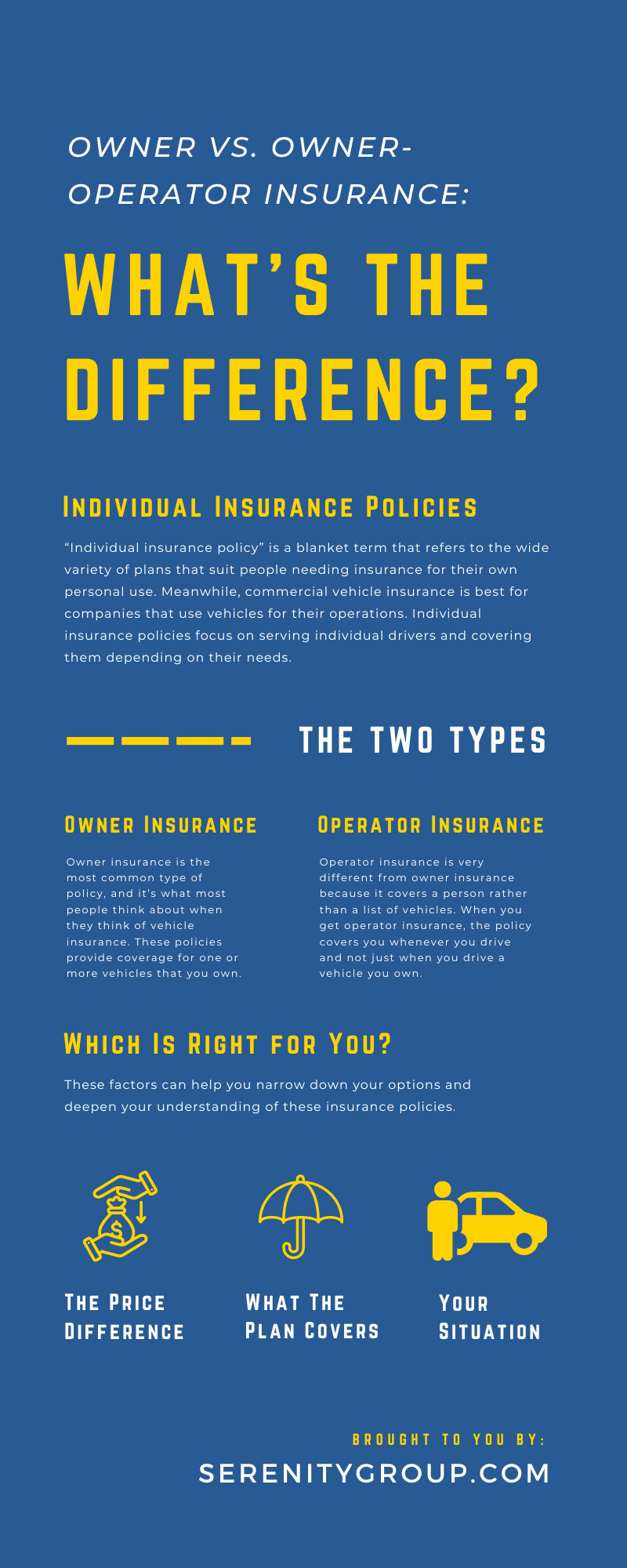Owner vs. Owner-Operator Insurance: What’s the Difference?

Insurance policies are a vital part of driving, whether it’s for work or for fun. However, buying insurance can be quite complex and difficult to navigate, as there are so many different policies to choose from. Explore the individual insurance policies on the market that you should consider for yourself.
Individual Insurance Policies
“Individual insurance policy” is a blanket term that refers to the wide variety of plans that suit people needing insurance for their own personal use. Meanwhile, commercial vehicle insurance is best for companies that use vehicles for their operations. Individual insurance policies focus on serving individual drivers and covering them depending on their needs. Take a deeper look at these policies and some of the major choices you’ll need to make as a policyholder.
The Two Types
When it comes to individual policies, most policies fall into two categories: owner and operator. Learning the difference between these two policy styles will help you find the perfect policy for your needs. It’s important to note that there’s not a single policy that’s better in every way—instead, some policies are better for your needs and driving history.
Owner Insurance
Owner insurance is the most common type of policy, and it’s what most people think about when they think of vehicle insurance. These policies provide coverage for one or more vehicles that you own. When you get the policy, you must list the cars you want on the policy before you can seal the deal with the company. The specifics of the vehicles can have heavy influences on the price of your insurance policy.
Operator Insurance
Operator insurance is very different from owner insurance because it covers a person rather than a list of vehicles. When you get operator insurance, the policy covers you whenever you drive and not just when you drive a vehicle you own. This insurance also goes by the name “non-owner car insurance” in many states. Keep in mind that if you drive the vehicle of someone in your household, their insurance may cover you even if you don’t have operator insurance. If you are considering coverage options and want insurance that protects you when you drive household vehicles, start by looking at your household’s existing plans.
Owner-Operator Insurance
While most policies fall under the owner or operator insurance categories, some plans blend the two. These plans cover both specific vehicles and drivers in the event that they drive a vehicle they don’t own. These policies are perfect for people who have a vehicle at home but also drive vehicles that they don’t own for a variety of reasons. Understanding the difference between owner and owner-operator insurance is important for picking your insurance plan.
The Target of Coverage
The main difference between these policies is who or what they cover. Non-owner insurance focuses on covering an individual person, which offers them protection whenever they’re behind the wheel of any vehicle. Owner insurance focuses on protecting a vehicle, which means it only takes effect when the vehicle in question is a part of an incident. However, it protects the vehicles at all times and can even provide coverage when someone else is driving the car. Owner-operator insurance covers both you and your vehicles.
Special Insurance Requirements
It’s important to note that both insurance policy styles will fit with most special insurance requirements for the state. Every state has its own requirements and can use different legal restrictions to change and influence insurance policies in the state. For example, SR-22 insurance is only useful in states that use the SR-22 system, but both insurance types will work with it. Additionally, it’s possible to get affordable SR-22 car insurance on either plan type if you need it.
Which Is Right for You?
Picking the right insurance for your own personal needs isn’t easy. It takes a lot of understanding of your own needs and what each plan offers for you to identify which option is the best for you. Read through some of the major considerations you should keep in mind when picking out an insurance policy. These factors can help you narrow down your options and deepen your understanding of these insurance policies.
The Price Difference
One of the biggest differences in these policies is the price difference between each policy type. For plans that offer the same level of coverage, non-owner insurance is usually cheaper than owner insurance plans. However, things may change if you start adding extra coverage to balance the lack of coverage in non-owner insurance. Examples of extra coverage you may opt for include damage to the vehicle or medical expenses after an accident.
What The Plan Covers
Understanding what each plan covers will help you choose the right one for your needs. In most cases, owner insurance will cover more, as it protects your car instead of just covering your liability in case of an accident. However, under certain plans, you may have to cover medical costs for yourself and repair your own vehicle after an accident rather than relying on the insurance.
Your Situation
In the end, your decision should best reflect your personal needs as a driver. If you don’t own a vehicle, then non-owner insurance is likely the best option for you—especially if you drive several different cars that you don’t own. If you own a vehicle, then standard owner insurance will likely be your best bet. However, you should always consider owner-operator insurance, as it mixes the best of both worlds, covering you no matter if you’re driving your own vehicle or need to use a friend’s car for a short time. Many people can benefit from using a hybrid insurance policy, so it is worthwhile to look into your plan options and determine if hybrid insurance suits your needs.
Understanding the differences between owner insurance and owner-operator insurance can help you make the most informed decision regarding insurance plans and coverage for yourself or your vehicle. You need insurance to drive, and both options can benefit you and provide excellent protection.


Recent Comments